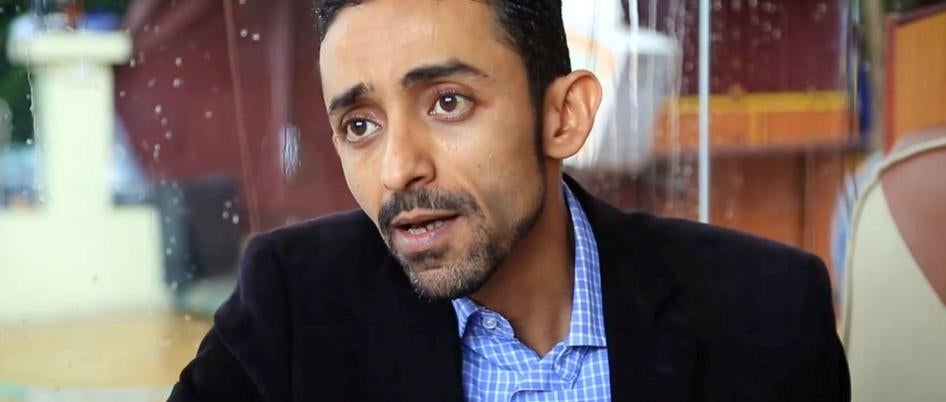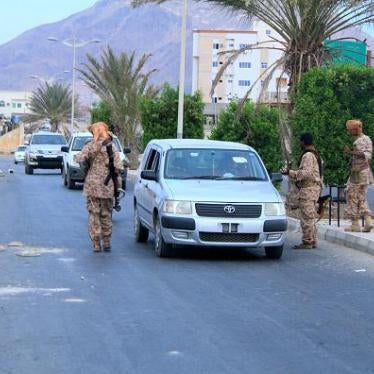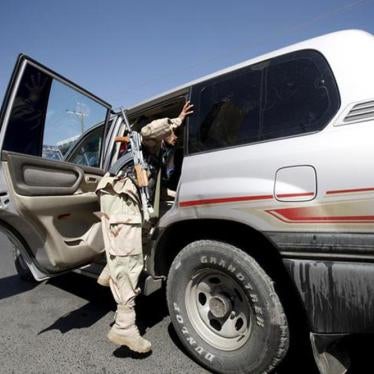(Beirut) – Houthi authorities in Yemen’s capital, Sanaa, should immediately and unconditionally release Hisham al-Omeisy, a prominent activist detained on August 14, 2017, Human Rights Watch said today.
Al-Omeisy, 38, has been an important public voice in Yemen, providing commentary on the country’s armed conflict. He has used social media, tweeting in English and Arabic, to report on and analyze events in real-time, including airstrikes by the Saudi-led coalition that supports the government of President Abdu Rabbu Mansour Hadi. He has also addressed the closing of space for nongovernmental groups and the impact of the war on Yemeni civilians.
“Yemen more than ever needs activists like Hisham al-Omeisy to bring attention to the devastation that war, famine, and disease have wrought on the country and its people,” said Sarah Leah Whitson, Middle East director at Human Rights Watch. “Houthi authorities should immediately release al-Omeisy and return him safely to his family.”
At about 2:45 p.m. on August 14, approximately 15 security officers arrested al-Omeisy in the Sanaa neighborhood of Jawlat al-Misbahi. Four days after the arrest, the National Security Bureau (NSB) is still holding al-Omeisy in an undisclosed location. He has not been charged, brought before a judge, or given access to a lawyer or his family.
The Houthis, also known as Ansar Allah, have controlled Sanaa and much of Yemen since September 2014. On July 28, 2016, the Houthis and former President Ali Abdullah Saleh’s General People’s Congress announced the formation of a governing council to run the country. The Supreme Political Council oversees the Sanaa-based Interior Ministry, which in turn supervises detention sites in Houthi and Saleh-controlled Yemen.
Parties to the armed conflict in Yemen have severely restricted the ability of nongovernmental groups to operate, Human Rights Watch said. In areas under the control of the Houthis and forces loyal to Saleh, the authorities have detained journalists and activists and have looted or closed groups’ offices. In areas where the government retains authority, security forces have beaten, arbitrarily detained, and forcibly disappeared activists.
All authorities in Yemen should immediately cease targeting, harassing, and arbitrarily detaining activists and journalists, Human Rights Watch said.
Human Rights Watch has documented 66 cases in which Houthi-Saleh forces arbitrarily detained or forcibly disappeared people, including two deaths in custody and 11 cases of alleged torture or other ill-treatment, including the abuse of a child. Other international and Yemeni organizations have documented scores more cases. Yemeni government forces and Yemeni forces backed by the United Arab Emirates have also arbitrarily detained, forcibly disappeared, and tortured dozens of people elsewhere in the country.
Authorities from all sides across Yemen should immediately free those wrongfully held, end detention without access to lawyers or family members, and appropriately prosecute officials responsible for mistreatment, Human Rights Watch said.
Under international human rights law, an enforced disappearance occurs when the authorities take someone into custody and deny holding them or fail to disclose their fate or whereabouts. “Disappeared” people are at greater risk of torture and other ill-treatment, especially when they are detained outside formal detention facilities, such as police jails and prisons.
While the Sanaa-based authorities may take appropriate measures to address security concerns related to Yemen’s armed conflict, international human rights and humanitarian law protects the right not to be arbitrarily detained, tortured or ill-treated, or forcibly disappeared. At a minimum, those detained should be informed of the specific grounds for their arrest, be able to fairly contest their detention before an independent and impartial judge, have access to a lawyer and family members, and have their case periodically reviewed.
“Members of Yemen’s warring parties are putting themselves at risk of future prosecution if they don’t account for the whereabouts or otherwise mistreat those they have detained,” Whitson said.









